
The Band was a Canadian-American rock band formed in Toronto, Ontario, in 1967. It consisted of four Canadians and one American: Rick Danko, Garth Hudson, Richard Manuel, Robbie Robertson, and Levon Helm. The Band combined elements of Americana, folk, rock, jazz, country, and R&B, influencing subsequent and contemporary musicians such as George Harrison, Elton John, the Grateful Dead, Eric Clapton and Wilco.
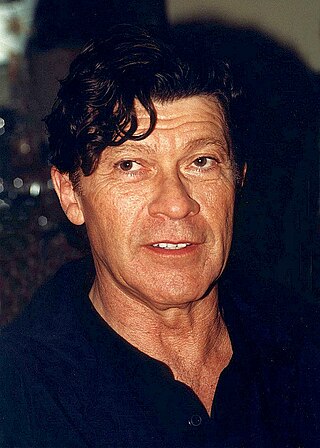
Jaime Royal "Robbie" Robertson, OC, is a Canadian musician. He is best known for his work as lead guitarist and songwriter for the Band, and for his career as a solo recording artist. With the deaths of Richard Manuel in 1986, Rick Danko in 1999, and Levon Helm in 2012, Robertson is one of only two living original members of the Band, with the other being Garth Hudson.

Mark Lavon "Levon" Helm was an American musician who achieved fame as the drummer and one of the three lead vocalists for the Band, for which he was inducted into the Rock and Roll Hall of Fame in 1994. Helm was known for his deeply soulful, country-accented voice, multi-instrumental ability, and creative drumming style, highlighted on many of the Band's recordings, such as "The Weight", "Up on Cripple Creek", and "The Night They Drove Old Dixie Down".

Ronald Cornett Hawkins was an American singer-songwriter, long based in Canada, whose career spanned more than half a century.
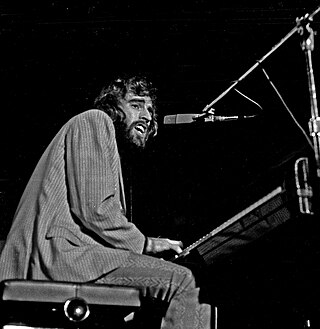
Richard George Manuel was a Canadian singer, multi-instrumentalist, and songwriter, best known as a pianist and one of three lead singers in The Band, for which he was posthumously inducted into the Rock and Roll Hall of Fame in 1994.

Eric "Garth" Hudson is a Canadian multi-instrumentalist best known as the keyboardist and occasional saxophonist for rock group the Band, for which he was inducted into the Rock and Roll Hall of Fame in 1994. He was a principal architect of the group's sound, described as "the most brilliant organist in the rock world" by Keyboard magazine. With the deaths of Richard Manuel in 1986, Rick Danko in 1999, and Levon Helm in 2012, Hudson is one of only two living original members of the Band, with the other being Robbie Robertson.
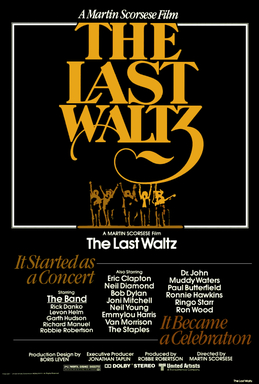
The Last Waltz was a concert by the Canadian-American rock group The Band, held on American Thanksgiving Day, November 25, 1976, at Winterland Ballroom in San Francisco. The Last Waltz was advertised as The Band's "farewell concert appearance", and the concert had The Band joined by more than a dozen special guests, including their previous employers Ronnie Hawkins and Bob Dylan, as well as Paul Butterfield, Bobby Charles, Eric Clapton, Neil Diamond, Emmylou Harris, Dr. John, Joni Mitchell, Van Morrison, Ringo Starr, Muddy Waters, Ronnie Wood, and Neil Young. The musical director for the concert was The Band's original record producer, John Simon.

Jericho is the eighth studio album by Canadian-American rock group the Band. Coming seventeen years after their "farewell concert", it was released in 1993 and was the first album to feature the latter-day configuration of the group, as well as their first release for the Rhino subsidiary Pyramid Records.

Jubilation is the tenth and final studio album by Canadian/American rock group the Band. Recorded in the spring of 1998 in Levon Helm's home studio in Woodstock, New York, it was released on September 15, 1998. For the first time since the group reformed without guitarist and songwriter Robbie Robertson, there were more originals than covers. Songs include "Last Train to Memphis", featuring guest guitarist Eric Clapton, Garth Hudson's solo instrumental closer "French Girls", Rick Danko's "High Cotton" and the ode to Ronnie Hawkins, "White Cadillac".

Across the Great Divide is a box set by Canadian-American rock group the Band. Released in 1994, it consists of two discs of songs from the Band's first seven albums, and a third disc of rarities taken from various studio sessions and live performances. The set is now out of print, having been replaced by the five-CD/one-DVD box set A Musical History that was released in September 2005.
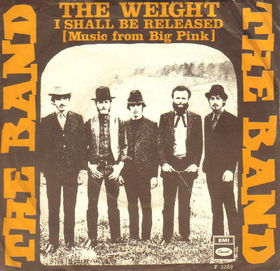
"The Weight" is a song by the Canadian-American group the Band that was released as a single in 1968 and on the group's debut album Music from Big Pink. It was their first release under this name, after their previous releases as Canadian Squires and Levon and the Hawks. Written by Band member Robbie Robertson, the song is about a visitor's experiences in a town mentioned in the lyric's first line as Nazareth. "The Weight" has significantly influenced American popular music, having been listed as No. 41 on Rolling Stone's 500 Greatest Songs of All Time published in 2004. Pitchfork Media named it the 13th best song of the Sixties, and the Rock and Roll Hall of Fame named it one of the 500 Songs that Shaped Rock and Roll. PBS, which broadcast performances of the song in Ramble at the Ryman (2011), Austin City Limits (2012), and Quick Hits (2012), describes it as "a masterpiece of Biblical allusions, enigmatic lines and iconic characters" and notes its enduring popularity as "an essential part of the American songbook."

John Paul Hammond is an American singer and musician. The son of record producer John H. Hammond, he is sometimes referred to as John Hammond Jr.
Times Like These was Band bassist Rick Danko's final album, a posthumous release featuring tracks from a variety of sources dating from an aborted solo project in 1993 to Danko's final live performance in Ann Arbor, Michigan just days before his death.
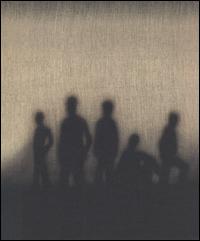
A Musical History is the second box set to anthologize Canadian-American rock group the Band. Released by Capitol Records on September 27, 2005, it features 111 tracks spread over five compact discs and one DVD. Roughly spanning the group's journey from 1961 to 1977, from their days behind Ronnie Hawkins and Bob Dylan through the departure of Robbie Robertson and the first disbanding of the group. The set includes highlights from each of the group's first seven studio albums and both major live recordings and nearly forty rare or previously unreleased performances.

"Who Do You Love?" is a song written by American rock and roll pioneer Bo Diddley. Recorded in 1956, it is one of his most popular and enduring works. The song represents one of Bo Diddley's strongest lyrical efforts and uses a combination of hoodoo-type imagery and boasting. It is an upbeat rocker, but the original did not use the signature Bo Diddley beat rhythm.

Edward Hoh was an American rock drummer who was active in the 1960s. Although primarily a studio session and touring drummer, Hoh exhibited a degree of originality and showmanship that set him apart and several of his contributions have been singled out for acknowledgment by music critics.

Levon Helm and the RCO All-Stars is a 1977 album by the short-lived musical group of the same name. It was Levon Helm's first studio album independent of The Band.

Levon Helm is a 1978 album by Levon Helm. It was Helm's second studio album independent of the Band.
"Jemima Surrender" is a song written by Levon Helm and Robbie Robertson. It was first released on the Band's self-titled album in 1969. Usual Band drummer Levon Helm played guitar and sang the lead vocal while usual Band pianist Richard Manuel played drums. The song's lasciviousness helped inspire Naomi Weisstein to form the Chicago Women's Liberation Rock Band.

















